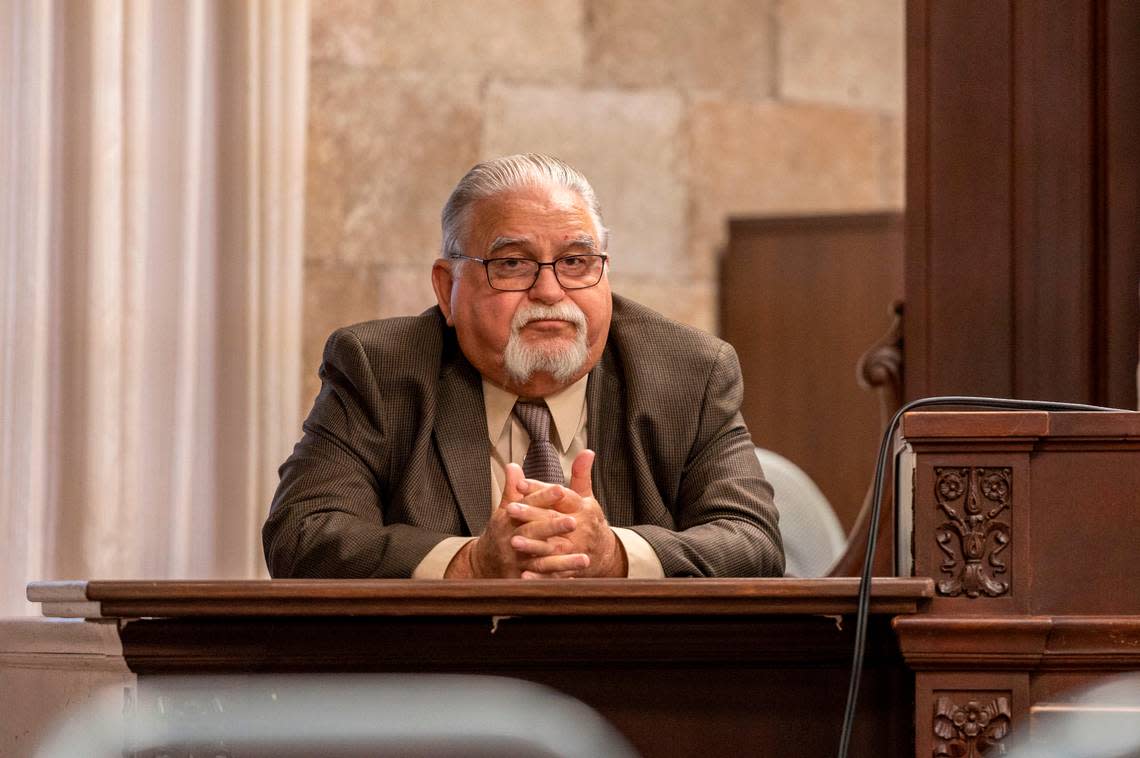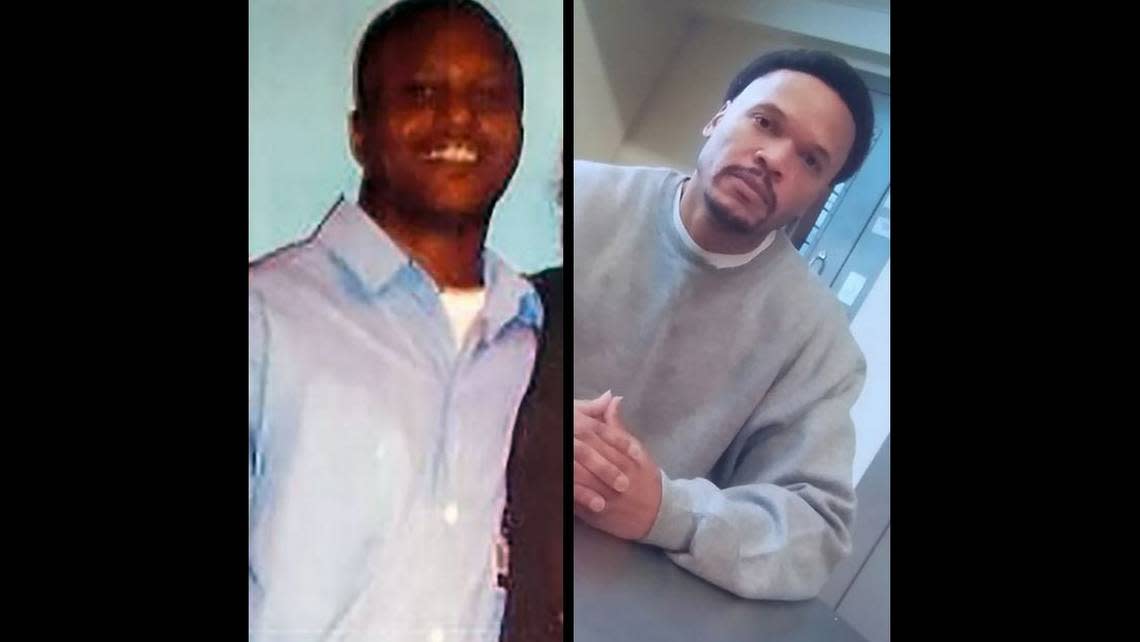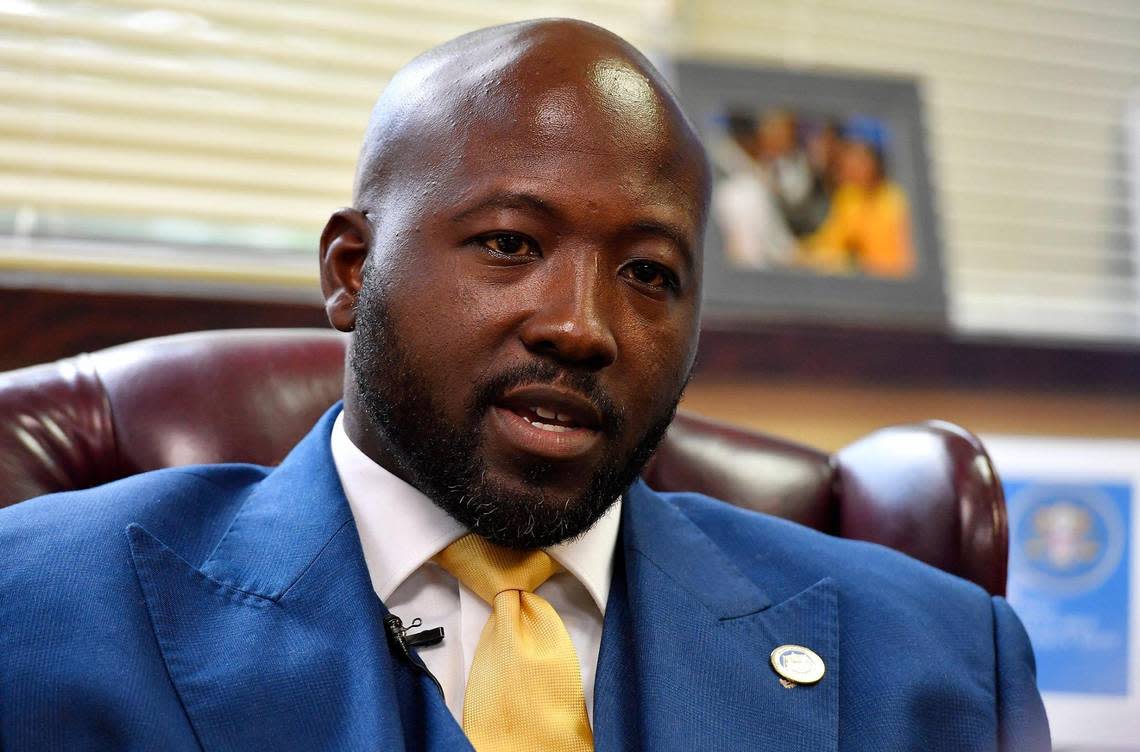Two prisoners deny committing 1997 Kansas City, Kan., murder, allege Golubski tampering
Two prisoners said in a court hearing Tuesday that they had nothing to do with a 1997 murder in Kansas City, Kansas, for which they have spent more than 23 years in prison.
Brian Betts, 46, and Celester McKinney, 52, took the stand during a hearing in Wyandotte County that has centered on whether former police detective Roger Golubski, who is now under federal indictment, was involved in obtaining their convictions.
When he took the stand, Betts said he was in bed with his girlfriend and infant son when 17-year-old Gregory Miller was fatally shot in their neighborhood in KCK’s northeast end. McKinney testified next, saying he was asleep when the shots rang out outside.
“I’ve been telling everybody I’m innocent since Day One,” McKinney said.
Betts and McKinney, who were convicted of first-degree murder in Miller’s killing, were back in court for the second of a two-day hearing to determine if Golubski was involved in the case. Golubski testified Monday that he did not investigate Miller’s murder.
The answer matters because Golubski was Miller’s uncle through marriage and the brother-in-law of a witness in the case, which was not disclosed at trial. Lawyers for Betts and McKinney also allege that Golubski fed information to witnesses.

McKinney’s brother, Dwayne McKinney, was also charged with the murder but was acquitted. No physical evidence tied the men to the killing. Police never recovered the weapons.
In a jail uniform and with his feet shackled, Betts testified that he was basically “left to defend himself” at trial because his attorney did not communicate with him. That lawyer, he said, also did not ask for information from prosecutors because he did not want to “piss the DA off.”
Betts and McKinney described their convictions as similar to that of Lamonte McIntyre, who spent 23 years in prison for a double murder he did not commit in KCK. McIntyre later filed a lawsuit, alleging Golubski framed him, which recently settled for $12.5 million.
The two prisoners said they never owned guns and would have let detectives search the house where they were staying had they asked.
Golubski, who worked at KCKPD from 1975 to 2010, was indicted last month on federal civil rights charges that accuse him of sexually assaulting and kidnapping a woman and a teenager from 1998 to 2002. Though the indictment cites two victims, prosecutors contend Golubski stalked and raped additional women. Now 69, he has pleaded not guilty.
At the start of Tuesday’s hearing, Betts’ attorney, Kevin Shepherd, said he was provided late discovery Monday night in the form of a summary of the prosecution’s case. Shepherd described the DA’s office as playing “a game” and asked that he be allowed to review the DA’s entire file — a request that was denied by retired Judge Gunnar Sundby, who is overseeing the case in a senior judge role.

Assistant District Attorney Kayla Roehler said the DA’s office turned over investigative reports, but that it was not asked to disclose the document Shepherd was provided for the first time Monday. Besides, she said, Golubski was not referenced in that document.
Outside the courtroom, Tricia Rojo Bushnell, executive director of the Midwest Innocence Project, said she and other lawyers have also been denied records that defendants are entitled to at trial by the DA’s office.
“Why wouldn’t a prosecutor want to hand over the investigative files?” Rojo Bushnell asked. “What is there to hide?”
Roehler repeatedly objected to questions from Betts’ and McKinney’s lawyers when her boss, District Attorney Mark Dupree, took the stand. That included when McKinney’s lawyer, Sarah Swain, asked if Dupree’s Community Integrity Unit, which is charged with investigating possible wrongful convictions and police misconduct, had looked into the convictions of Betts and McKinney.
Shepherd, Betts’ attorney, told the judge that Betts and McKinney were being “handcuffed” by him and the DA’s office in pursuing their innocence claims by not opening the entire file.
Dupree noted that his unit, known as the CIU, remains the only one of its kind in Kansas and has reviewed dozens of convictions. He said many things he has “inherited” as DA raise an eyebrow, but that evidence is needed to toss convictions in a courtroom.

Among the other witnesses called to the stand Tuesday was Paul Burmaster, who represented McKinney at trial and is now a Johnson County judge. He testified he was not aware Golubski was related to the victim and said he would have been interested in learning more about that had he known.
Burmaster recalled that the “circumstantial” case hinged on the testimony of Carter Betts, who is the uncle of the men and has since recanted his story implicating them, saying he was coerced by detectives and a prosecutor. In questioning from Swain, Burmaster agreed there was more than one witness in the case who changed their statements over time to police.
The former defense attorney also remembered that McKinney did not seem to have a motive for killing Miller.
“That really troubled me about it,” Burmaster said.
Last month, The Star published an investigation examining several questionable Wyandotte County convictions, including that of Betts and McKinney. Those cases illustrated allegations raised in recent years about the practices of former KCK detectives, including Golubski, which included coercing witnesses and falsifying evidence.
The DA’s office and the attorneys for Betts and McKinney will submit written arguments in the next 30 days. During a virtual hearing after that, the judge will announce his decision on whether to throw out the men’s convictions.
If the judge rules in favor of the men, the DA’s office will have to decide whether to try them again.
